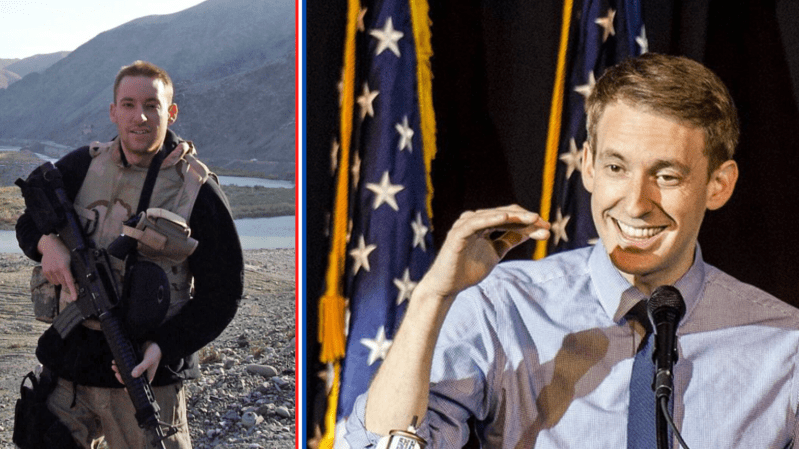The following is an Op/Ed written by Ken Falke. The opinions expressed are his own.
There’s an important day of commemoration on March 29th — or in some U.S. States, March 30th — that goes unnoticed until the nightly evening news or a stumble on social media. This very special day is Vietnam Veterans Day, or in some states, “Welcome Home Vietnam Veterans Day.”
In 1974, President Nixon established this commemoration to recognize the contributions of the men and women who served during this unpopular war and tumultuous time in our history.

Vietnam War memorial. (Photo: Wikimedia Commons | InSapphoWeTrust)
While many will rightly mark the day with speeches, tributes, and celebrations fitting for this great generation, there is a more meaningful way to honor our Vietnam veterans and all veterans. That honor is to provide them new and innovative ways to improve their mental wellness and reintegration into their communities.
Approximately 2.7 million young men and women served in Vietnam — about the same number that have served in Iraq and Afghanistan since September 2001. While all serving since 9/11 volunteered, few realize that almost two-thirds of Vietnam veterans volunteered to serve as well.
Even though Vietnam was an unpopular war, 91 percent of Vietnam Veterans said they were glad they served in the war, and one-quarter said they would do it again. What these numbers show is the incredible commitment to service that our Vietnam-era veterans share with the post-9/11 veteran generation.
But there are disturbing similarities as well. The current veteran suicide rate of 20+ per day is well publicized; though that the average age of the veteran is 55 years old is less known. PTSD rates from both generations hover around 30 percent.

An American Green Beret (right), and a South Vietnamese soldier assist wounded Vietnamese soldier to medivac helicopter following fighting near the Special Forces camp at Duc Phong, 40 miles north of Saigon, Sept. 9, 1969. South Vietnamese spokesmen said government casualties reached a two-month high 502 dead and 1,210 wounded. It was the highest casualty toll since the week ending June 14, which saw 516 dead and 1,424 wounded. (Image by © Bettmann/CORBIS by Shunsuke Akatsuka)
Additionally, Vietnam veterans struggled — and many still do — with the same challenges that today’s veterans face: PTSD, anxiety, drug, and alcohol dependency, and family and work stability. By a percentage comparison, of the 591 Vietnam prisoners of war (POWs) only 4 percent had symptoms of PTSD.
So why did POWs who experience what would be considered the most traumatic experiences seem to fare so well?
Many suggest the leadership of Admiral James Stockdale while a POW in the “Hanoi Hilton.” His leadership provided purpose, mission, and direction as a team to “return with honor.”
Often, the sense of purpose provided by leadership during transitions facilitates growth to occur. While the DOD, the VA, and other organizations work hard to care for our veterans, the element of leadership seems to be lost after service and veterans fall into a “no-man’s land” that lacks wellness, a clear mission, and renewed purpose.
Why have we made so little progress in mental wellness for our returning warriors?
Many experts, including the Journal of American Medical Association, suggest that our reactive approach to combat related stress such as PTSD doesn’t work. Indicators show that our current approach has made little progress since the Vietnam War, and some suggest since World War I.

We are repeating minimally effective practices where veterans are offered medication, which largely attacks symptoms and leaves them as diminished versions of themselves, or talk-therapy provided by well-intended but often ill-equipped therapists, and cased in stigma.
Though the VA has announced plans to hire 1,000 additional mental health professionals, more therapists will not fix the inadequacies of the current approaches.
How can we do better?
First, expand public-private partnerships. The private sector and nonprofit organizations have developed new approaches to veteran wellness and reintegration that could be expanded. These approaches leverage training (which is compatible with military personnel and veteran culture) and new technology that could “triage” veterans and provide skills to facilitate Post-traumatic Growth before the need for medication or therapy.
Second, we need to recognize and address the stigma associated with therapy. While veterans — and civilians — can gain some benefit from talk-therapy and medication, one can only grow by learning the skills associated with growth. This requires a holistic training approach that veterans understand and allows them to thrive, not just survive.
Finally, innovation costs money. The President’s proposed budget has a 6 percent increase to the VA’s budget; much of it to focus on health care. While this is positive, we need to use new funds to create innovative solutions, not further outdated practices. While the conflicts in Iraq and Afghanistan continue and future threats remain, veteran mental health issues will likely worsen.
This March 29th and 30th we will stop to honor and welcome home our Vietnam veterans. While speeches, ceremonies, and commemorations will recognize their sacrifice, to truly honor their service — and the service of those that follow — we should facilitate growth and purposeful lives they truly deserve and welcomes them home.
Recognized as one of We Are The Mighty’s 25 veterans to watch in 2017, Ken Falke is a 21-year service-disabled combat veteran of the U.S. Navy and retired Master Chief Petty Officer and is the CEO of organizational improvement solutions company Shoulder 2 Shoulder, Inc. He is also the founder and Chairman of Boulder Crest Retreat.


























